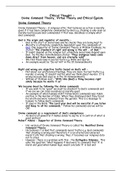Lecture notes
Ethical thought- divine command theory, egoism and virtue theory
- Module
- Unit 3 - Religion and Ethics
- Institution
- WJEC
this is a document which contains information on divine command theory, objective truths, Robert Adams modified version of divine command theory, the euthryphro dilemma, the pluralsim objection, the arbitrariness problem, the strengths and weaknesses of divine command theory, virtue theory as well ...
[Show more]




